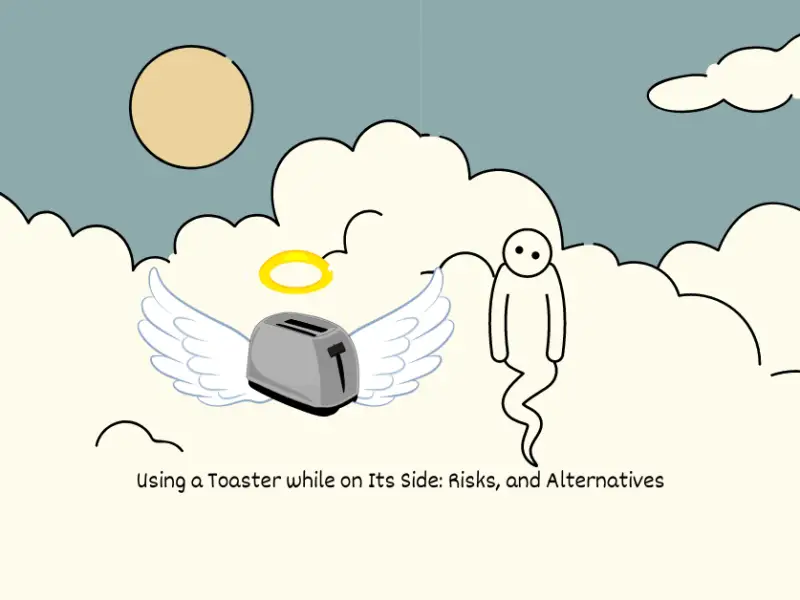I am a well-rounded expert with proficiency in several fields. My experience spans from being a dedicated chef and homemaker. As a passionate homesteader, I’ve honed my skills in sustainable living and animal care, ensuring a holistic approach to everything I undertake. Email me or Txt: (# removed due to spam, please email)
Noisy refrigerators can be a nuisance in any household, and it’s essential to understand the different components that might be causing the problem.
In this article, we’ll explore some common refrigerator components that may cause noise, help you identify potential issues, and provide solutions to fix them. Let’s dive in and learn how to keep your refrigerator running smoothly and quietly.

Common Noisy Refrigerator Components
Check out our guide on Understanding Refrigerator and Fridge Noise: Causes, Dangers, and Solutions to help diagnose and fix a noisy fridge
Noisy Refrigerator Evaporator Fan
Function of the evaporator fan: The evaporator fan is responsible for circulating cold air throughout your refrigerator and freezer. It helps maintain an even temperature and ensures your food stays fresh.
Symptoms of a noisy evaporator fan: A noisy evaporator fan typically produces a buzzing, humming, or clicking sound. This noise can be constant or intermittent, depending on the issue.
Causes of a noisy evaporator fan: Common causes of a noisy evaporator fan include ice buildup, loose or worn fan blades, or a failing motor. Regular maintenance and cleaning can help prevent these issues.
Potential solutions for a noisy evaporator fan:
- Defrost the freezer: If ice buildup is causing the noise, defrosting the freezer can help. Turn off the refrigerator and freezer, remove all food and shelves, and allow the ice to melt. Once the ice has melted, clean the freezer and restart the unit.
- Tighten or replace fan blades: Loose or worn fan blades can cause a noisy evaporator fan. Tighten the blades using a screwdriver, or replace them if they are damaged.
- Replace the motor: If the motor is failing, it may need to be replaced. Contact a professional to diagnose the issue and replace the motor if necessary.
- Regular maintenance: Regular cleaning and maintenance can help prevent issues with your evaporator fan. Clean the fan blades and housing regularly to remove dust and debris, and replace the fan motor if it shows signs of wear or damage.

Noisy Refrigerator Condenser Fan
- Function of the condenser fan: The condenser fan cools the refrigerant in the condenser coils, which helps remove heat from your refrigerator. A well-functioning condenser fan is vital for efficient cooling.
- Symptoms of a noisy condenser fan: A noisy condenser fan may produce a rattling or grinding sound. This noise is usually more noticeable when the refrigerator is running its cooling cycle.
- Causes of a noisy condenser fan: Causes of a noisy condenser fan include debris or dust buildup, worn or damaged fan blades, or a failing motor. Regular cleaning and inspection can help prevent these issues.
Potential solutions for a noisy condenser fan:
- Clean the fan and coils: Debris and dust buildup can cause the fan to work harder and produce more noise. Turn off the refrigerator and unplug it, then remove any debris or dust from the fan and coils using a soft brush or vacuum cleaner.
- Tighten or replace fan blades: Worn or damaged fan blades can cause a noisy condenser fan. Tighten the blades using a screwdriver or replace them if they are damaged.
- Replace the motor: If the motor is failing, it may need to be replaced. Contact a professional to diagnose the issue and replace the motor if necessary.
- Regular maintenance: Regular cleaning and maintenance can help prevent issues with your condenser fan. Clean the fan blades and housing regularly to remove dust and debris, and replace the fan motor if it shows signs of wear or damage.

Noisy Refrigerator Water Dispenser
- Function of the water dispenser: The water dispenser provides easy access to chilled water without opening the refrigerator door. It’s a convenient feature found in many modern refrigerators.
- Symptoms of a noisy water dispenser: A noisy water dispenser may produce a loud buzzing or humming sound when dispensing water. This noise can be quite noticeable and annoying.
- Causes of a noisy water dispenser: A noisy water dispenser can result from trapped air in the water line, a malfunctioning valve, or a clogged filter. Regular maintenance and filter replacement can help keep your water dispenser running quietly.
Potential solutions for a noisy water dispenser:
- Flush the water line: Trapped air in the water line can cause a buzzing sound when dispensing water. Flush the water line by dispensing several glasses of water, allowing the air to escape.
- Check the water valve: If the valve is malfunctioning, it may cause a loud buzzing or humming sound. Contact a professional to diagnose and replace the valve if necessary.
- Replace the water filter: A clogged water filter can cause reduced water flow and a noisy water dispenser. Replace the water filter according to the manufacturer’s recommendations.
- Regular maintenance: Regular cleaning and maintenance can help prevent issues with your water dispenser. Clean the dispenser and surrounding area to remove any debris or dirt that may be causing noise.
By addressing the issue promptly and following these potential solutions, you can ensure that your refrigerator’s water dispenser operates smoothly and quietly, providing you with fresh, chilled water whenever you need it.

Noisy Refrigerator Evaporator Fan Motor
- Function of the evaporator fan motor: The evaporator fan motor powers the evaporator fan, ensuring proper air circulation inside the refrigerator and freezer compartments.
- Symptoms of a noisy evaporator fan motor: A noisy evaporator fan motor may produce a loud humming or grinding noise that gets worse over time.
- Causes of a noisy evaporator fan motor: A noisy evaporator fan motor may be caused by worn motor bearings or a malfunctioning motor. Replacing the motor is often the best solution to address this issue.
Potential solutions for a noisy evaporator fan motor:
- Replace the motor: If the motor is worn or malfunctioning, replacing it is often the best solution. Contact a professional to diagnose the issue and replace the motor if necessary.
- Regular maintenance: Regular cleaning and maintenance can help prevent issues with your evaporator fan motor. Clean the fan blades and housing regularly to remove dust and debris, and replace the fan motor if it shows signs of wear or damage.
By addressing the issue promptly and following these potential solutions, you can ensure that your refrigerator’s evaporator fan motor operates smoothly and quietly, ensuring proper air circulation inside the refrigerator and freezer compartments, and keeping your food fresh.

Identifying and Troubleshooting Fridge Noise
What Causes a Fridge Freezer to be Noisy
- Component-related issues: As we’ve discussed, various components within your fridge freezer can cause noise, such as the evaporator fan, condenser fan, water dispenser, or evaporator fan motor.
- Installation and leveling issues: An improperly installed or unlevel fridge freezer can also produce noise. Ensuring your refrigerator is level and correctly installed can help reduce vibration and noise.
Fridge Noise Troubleshooting
- Inspecting refrigerator components: Regularly inspect your refrigerator’s components for wear, damage, or debris buildup. Cleaning and maintaining these parts can help prevent noise and ensure optimal performance.
- Diagnosing and addressing leveling problems: Use a bubble level to check if your refrigerator is properly leveled. Adjust the feet if necessary to ensure your refrigerator sits evenly on the floor, reducing vibrations and noise.

How to Stop Noise from Fridge
Refrigerator Noise Reduction Tips
- Proper installation and maintenance: Ensure your refrigerator is correctly installed and follow the manufacturer’s maintenance guidelines. Regular cleaning and inspection of components can help prevent noise and maintain efficiency.
- Dampening vibration and sound: Place your refrigerator on a vibration-dampening mat or use rubber pads under the feet to reduce noise caused by vibrations. You can also insulate the refrigerator’s exterior walls with acoustic foam or insulation to further minimize noise.
- Replacing worn or damaged components: Replace any worn or damaged components, such as fan blades or motors, to restore your refrigerator’s quiet operation. Consult your refrigerator’s manual or seek professional help if you’re unsure about the process.
Other refrigerator noise reduction tips include:
- Proper ventilation: Make sure that the refrigerator has adequate ventilation to allow for proper air circulation. This will prevent the compressor from overworking and producing excessive noise.
- Temperature control: Keep the refrigerator at a consistent temperature to prevent the compressor from turning on and off frequently, which can cause noise.
- Door seals: Ensure that the door seals are tight and free from debris to prevent air leaks and noise.
- Location: Choose a location for the refrigerator that is away from high-traffic areas and heat sources, such as ovens and direct sunlight.
By following these tips, you can reduce the noise produced by your refrigerator and ensure that it operates smoothly and efficiently.
Seeking Professional Assistance for Complex Issues
If you’re unable to identify the cause of your noisy refrigerator or if the issue seems too complicated to fix on your own, consider seeking help from a professional appliance technician. They can diagnose and address the problem, ensuring your refrigerator runs quietly and efficiently.
Remember that self repair may void warranty. In that case, You should always hire a licensed repair person to troubleshoot and repair.

Conclusion
Dealing with a noisy refrigerator can be frustrating, but understanding the components that may be causing the noise and taking proactive steps to address the issue can make a significant difference. Regular maintenance, proper installation, and timely replacement of worn or damaged components are key to maintaining a quiet and efficient refrigerator. If you’re unsure about how to proceed, seeking professional assistance can ensure your refrigerator runs smoothly and silently for years to come.



